How to Read “A child who doesn’t resemble their parents is a demon child”
Oya ni ninu ko wa onigo
Meaning of “A child who doesn’t resemble their parents is a demon child”
This proverb expresses a prejudice that children who don’t resemble their parents are abnormal. It represents a discriminatory way of thinking that puts negative labels on children whose appearance, personality, or abilities differ from their parents.
In traditional values that emphasized blood relations, similarity between parent and child was seen as proof of legitimacy. Children who didn’t resemble their parents were viewed as “not normal” or “strange.”
Sometimes these children were even excluded from their families or communities.
Today, advances in genetics have helped us understand that a child’s individuality forms through many different factors. This proverb should be recognized as discriminatory expression based on prejudice without scientific basis.
Not resembling one’s parents is not abnormal. Rather, it’s an expression of individuality and shows each person’s uniqueness.
Origin and Etymology
The exact first appearance of this proverb in literature hasn’t been identified. However, the structure of the phrase reveals an interesting background.
Let’s focus on the word “onigo” (demon child). In ancient Japan, people felt strong anxiety toward children who didn’t resemble their parents or had unexpected characteristics.
In the family system that valued blood ties above all else, parent-child similarity was considered important proof of family legitimacy.
The expression “oni” (demon) represents not just malice, but fear of things that couldn’t be understood or explained. In an era when medicine and genetics were undeveloped, people couldn’t explain why children didn’t resemble their parents.
Therefore, people likely used the word “oni” to describe supernatural forces or abnormal existence.
The background of this proverb also includes strong pressure toward conformity in village communities. Group psychology that tried to exclude different things created prejudice against children who didn’t resemble their parents.
Some theories suggest this way of thinking was further strengthened during the Edo period’s family succession system. Those who inherited the family were expected to resemble their parents.
When they didn’t, they were sometimes viewed with suspicion.
Usage Examples
- That family apparently blames their daughter with the old-fashioned idea that a child who doesn’t resemble their parents is a demon child
- The prejudice that a child who doesn’t resemble their parents is a demon child has hurt so many children over the years
Universal Wisdom
This proverb reflects the universal human psychology of “comfort with similarity” and “fear of difference.” Why do people feel secure with things similar to themselves and anxious about things that are different?
It’s because understandable things feel predictable and controllable. When parents seek similarity with their children, it’s not just about proving blood relations.
It also expresses the psychology of wanting to predict their child’s future and feel secure. If the child is similar, they can believe their own experience will be useful.
However, deep anxiety lurks behind this sense of security. It’s the fear of things that can’t be explained or understood.
In times when science was undeveloped, people attributed unexplainable phenomena to supernatural beings like “oni” or “yokai.” Children who didn’t resemble their parents were also among these unexplainable existences.
This proverb has been passed down for so long because it put into words an instinctive human fear. At the same time, this proverb also functioned as a tool of social pressure to maintain group conformity.
The human tendency to strengthen group unity by excluding different things appears here.
Our ancestors recognized the existence of this prejudice but didn’t have enough wisdom to overcome it. However, because this proverb still remains today, we can learn about the deep-rooted nature of human prejudice.
We can also understand the necessity of efforts to overcome it.
When AI Hears This
The probability of a child being born who doesn’t resemble their parents is surprisingly high from a genetic perspective. For example, there are over 16 types of genes that determine eye color alone, each with combinations of dominant and recessive traits.
Even if both parents have brown eyes, if they both carry the recessive blue eye gene, the probability of their child having blue eyes is 25 percent. This is a completely normal phenomenon explained by Mendel’s laws.
What’s even more interesting is that humans have about 20,000 genes, and the combination patterns exceed 70 trillion. In other words, even siblings born from the same parents are genetically very different, except for identical twins.
Atavism, where grandparents’ traits appear in grandchildren, is not uncommon. This includes cases where a tall grandchild is suddenly born from a tall grandfather and short parents.
Additionally, a mechanism called epigenetics is important. This refers to phenomena where the gene sequence itself doesn’t change, but environmental factors turn specific genes on or off.
Research shows that a mother’s nutritional status and stress during pregnancy can affect the child’s gene expression patterns.
In other words, “not resembling parents” is not abnormal. Rather, it’s an ingenious design that creates biological diversity.
Lessons for Today
This proverb teaches us about the dangers of prejudice. It shows how much harm has been caused by judging people based only on superficial similarities.
In modern society, we understand that diversity itself is the source of richness. Children who don’t resemble their parents are not abnormal.
They are beings with unique individuality and potential. Recognizing and respecting each person’s differences is the first step toward creating a better society.
If you’re a parent, don’t seek similarity with yourself in your child. Instead, find and nurture that child’s unique talents and individuality.
If you’re a child, you don’t need to be ashamed of being different from your parents. You have value as yourself.
Also, toward people around you, have eyes that see the person themselves without judging by superficial differences. We can create a society that respects each person’s individuality without being bound by old prejudices.
This proverb gives us an important lesson as a relic of the past that should be overcome.



Comments